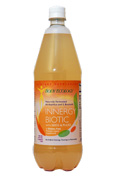Strep B and the Body Ecology Recommendations to Prevent and Overcome It
Most pregnant women strive to take meticulous care of themselves during pregnancy. Eating well, resting and a moderate amount of light, gentle exercise like yoga is believed to be a recipe toward achieving a safe delivery and a healthy baby.
But has all of that changed?

Every pregnant woman hopes to deliver a healthy baby. But could the health of your baby be compromised during delivery?
Group B Strep
Group B Streptococcus (GBS) is a common bacteria that a significant number of women carry around in their vaginal, bowel and bladder area. It’s potentially harmless and you could live your life comfortably without ever knowing it’s there.
But for women giving birth, it’s a different story.
Group B Strep and Babies
An estimated 12,000 infants in the United States will become infected with GBS each year during delivery. (1) GBS can cause serious illness to these babies in the form of the blood infection, sepsis; pneumonia; and meningitis.
And some babies will die.
An estimated 2,000 will die and other large numbers will suffer permanent handicaps such as mild to severe brain damage, loss of sight and hearing, and lung damage. Others will survive without any damage whatsoever.
Pregnant Women and Group B Strep
Over 50,000 pregnant women each year will suffer fever after birth, uterine inflammation, and infections following cesarean sections, all because of the GBS bacteria.
In rare cases Group B Strep may cause bladder or womb infections to the mother.
How Is a Baby Infected?
During childbirth, the baby can come into direct contact with the bacteria carried by the mother as it travels through the birth canal. Transmission typically occurs after the rupture of membranes. The bacteria enters the baby’s blood stream and can create heartbreaking illness to the infant when it reaches the brain.
Even delivery through cesarean cannot prevent the baby’s potential infection of GBS.
Are Some Babies At A Higher Risk?
Women who carry large amounts of the bacteria are at greatest risk of having a baby infected with Group B Strep, but the risk increases in certain situations such as:
- Premature labor
- Premature rupture of the membranes
- Prolonged rupture of the membranes – 12 hours before the baby is born
- If the mother has a fever before or during labor
- Women who have had GBS in previous births
How Can a Woman Know If She Has the Group B Strep Bacteria?
Over the last few years, the US Centers for Disease Control and Prevention (CDC) and the American College of Obstetricians and Gynecologists (ACOG) recommend that all pregnant women be screened for Group B Streptococcus between weeks 35 and 37 of their pregnancies to determine if they’re carriers.
Screening involves taking a swab sample from both the vagina and rectum. Studies show that approximately 30 percent of all pregnant women tested are found to be colonized with GBS in either their vaginal or rectal area.2
Bacteria is tricky, though, and GBS can be present in small amounts on one day which would mean a negative culture. Because of this, many women are tested again at the time of delivery with what’s called a rapid test.
What Does a Positive Result Mean?
A positive culture simply means that the mother is a carrier for Group B Strep and is not a definitive indication that the baby will become ill. (2) Again, it is only the babies born to mothers who have a large amount of GBS that are at the greatest risk of infection.
How Would a Doctor Treat a Woman with a Positive Result?
The CDC and ACOG encourage all pregnant women who carry GBS to be treated during labor with intravenous antibiotics. Based on these recommendations, this is exactly what most women do.
And who could blame them? Even though less than 1% of women who do not receive treatment will deliver a baby who becomes ill from GBS, we are talking about a newborn baby and who wouldn’t do whatever they could to ensure its health and safety?
But are antibiotics always the answer? At Body Ecology we feel strongly that all women be educated on all the facts so please read on. This is a very important subject. With autism on the rise the use of antibiotics as the only solution will soon prove to be a serious mistake! To prove our point, one study found no decrease in GBS infection or deaths among newborns whose mothers were given IV antibiotics during labor.
What Can Happen to a Baby Whose Mother Was Treated for GBS During Labor?
While some studies are showing that giving antibiotics to women in labor with the GBS bacteria may decrease the rate of GBS infections among newborns, other research shows it’s possible that this “benefit” might be increasing the opportunity for other infections to occur.
A study, which looked at the rates of blood infection among newborns over a period of six years, found that antibiotics during labor may have reduced the instance of GBS infection, but increased the incidence of other forms of blood infection. 4
What Other Problems Can Occur?
Because we work with children with autism and because we specialize in an antifungal diet, we saw clearly that both fungal and viral infections are the foundation for autism.
Babies are coming into the world with a weakened immune system. An inner ecosystem is not established in their little intestinal tract when they are born so they do not have an immune system, yet we foolishly allow them to be vaccinated. Rather than becoming protected from pathogens like measles, mumps or rubella, these children become infected and the infections can and do enter the brain.
Regions in their brain can become inflamed and then develop hypoxia, a pathological condition where cells are deprived of an adequate oxygen supply. It’s scary to think of this happening to any living being but it is even more tragic when it happens to millions of children around the world who could have been strong and healthy.
Is There An Alternative To Antibiotics
Only you can make the decision of how you want to treat yourself and your baby. Regardless of what you choose to do, it’s important that you follow two basic steps:
Preventative Care and After Care
At Body Ecology, we’re always guiding future parents to overcome their yeast infections and to build immunity and a healthy inner-ecosystem with a superior anti-fungal diet, such as the Body Ecology Diet.
Sadly, most young woman of child bearing age have taken large amounts of antibiotics as children, and their blood is too acidic because they have been eating a high sugar diet throughout their lives. They already have a systemic fungal infection in their bloodstream and when they become pregnant, this infection becomes acute over the nine months.
Also, because we do not eat fermented foods in our culture, a pregnant woman’s birth canal does not have large amounts of friendly microflora to suppress pathogens like Group B Strep. .
The Body Ecology Diet is not only an ideal anti-fungal diet, it also has a variety of delicious and exceptionally-nourishing foods for a pregnant woman. Ours is sugar-free, as well as a gluten-free diet.
By eating fermented foods and drinks, such as those recommended in the Body Ecology Diet, a mother-to-be can create a healthy inner-ecosystem that will allow her baby to flourish inside her womb. These incredible superfoods are crucial in the diets of every woman who wants a civilization of beneficial microflora populating her birth canal.
What Would We Like For All Women of Child Bearing Age to Know?
Eat a diet rich in fermented foods and drinks before you conceive your baby and definitely before your baby is delivered.
What benefits can you expect to gain?
- Healthy Bacteria Reigns – Yes, the healthy microflora in probiotic foods and drinks will build your own immune system. They will charge, challenge and conquer the pathogenic bacteria you don’t want in your body. Colonizing yourself with good bacteria is your best defense.
- Better Digestion – The mighty microflora will improve your digestion so that both you and your baby absorb more nutrients from your food.
- Detoxification – Microflora will attack toxins, allowing your body to release them with ease.
- Restore Balance – As you build a colony of healthy bacteria, you’ll also create the perfect balance of acid/alkaline in your gut.
- Reduce Cravings – Of course you want to eat the healthiest diet while you’re pregnant and cultured foods can help to keep your sugar cravings under control.
And Once the Baby is Born..
.
Nothing could be more effective in creating a strong immune system in your baby than cultured foods. After Mothers’ Milk, fermented liquids are the next most important foods in your newborn’s new diet.
Tiny spoonfuls of probiotic liquids or finely pureed cultured vegetables will help your baby digest Mothers’ Milk and the bevy of nutrients it offers. What could be more important to your baby’s health?
Fermented Foods Are Always Available
Body Ecology has probiotic liquids for you that are intensely rich in nutrients and beneficial microflora. Our own Coco-Biotic and Innergy Biotic, are perfect for every parent-to-be!
Or you can make your own fermented foods and drinks by using Body Ecology’s Kefir Starter, Veggie Culture Starter, or Essential Duo. They’re all right at your fingertips!

Establishing a healthy inner-ecosystem is the first critical step you can take to protect your unborn baby. Starting now can be the most valuable part of your pregnancy that you’ll ever experience.
Create a Healthy Pregnancy Right Now!
Whether you’re currently pregnant or planning to be in the near future or someday in the distant horizon, now is the time to prepare for a glowingly healthy baby.
Sources:
- Awareness of Group B Streptococcus Infection During Pregnancy, http://www.childbirth.org/articles/GBS.html
- Mothering Magazine Birth Preparation Article: Group B Strep, Pregnancy and Birth, http://www.mothering.com/articles/pregnancy_birth/birth_preparation/group-b.html
- Women’s Healthcare Topics, Strep B and Pregnancy, http://www.womenshealthcaretopics.com/strep_b.htm
- Mothering Magazine Birth Preparation Article: Group B Strep, Pregnancy and Birth,http://www.mothering.com/articles/pregnancy_birth/birth_preparation/group-b.html








